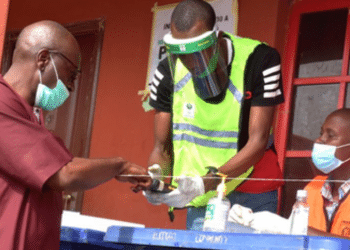The Federal Government’s decision to press ahead with the Water Resources bill has drawn a groundswell of opposition from Nigerians.
Ministers of Information and Culture, Alhaji Lai Mohammed and Water Resources, Suleiman Adamu, at a press conference in Abuja, yesterday, said critics were ignorant of proposed amendments and new provisions in the bill.
They said the bill was not new as it was an amalgamation of four water resources laws already in existence.
However, opponents of the bill said if passed into law, the Federal Government would not only deprive the states of the minerals and oil within their territories but would take the only resource left for states to administer to the benefit of their people.
Others also flayed the government for attempting to reintroduce the rejected RUGA in disguise.
But Mohammed insisted: “There is nothing new about the National Water Resources Bill. This is because it is an amalgamation of Water Resources Laws that have been in existence for a long time. So, why are the laws being re-packaged as the National Water Resources Bill 2020? The answer is that they are being re-enacted with necessary modifications to bring them in line with current global trends as well as best practices in Integrated Water Resources Management (IWRM). The overall objective of this amalgamation is the efficient management of the Water Resources Sector for the economic development of Nigeria and the well-being of its citizens.
“It is not the intention of the government to take over licensing and commercialising the use of water. This is not the intention, because the current Water Resources Act, 2004 (made pursuant to the Constitution) already makes provision for this. This bill is only trying to provide a framework for implementing that provision.”
Critics contend that the Bill, when passed into law, will clip the wings of state and local government authorities, as well as individuals, from making use of the water in their backyards without permission from Abuja.
Both ministers, however, said Nigerians could drill boreholes for private use without obtaining a licence as long as it was not for commercial purposes.
“You can drill a borehole in your house to use without a licence. But, there are multinationals who are drilling water and bottling it without a licence. This bill is not anti-people as critics have made it to be.
“This bill only relates to the management of water resources that crosses state boundaries. The Constitution already grants the federal legislature this responsibility (item 64, Exclusive Legislative List, CFRN 1999).
“The bill does not apply to water that is wholly within the boundaries of a state. It also does not apply to land. It clearly states that land required by any of the institutions established in the bill will be obtained in accordance with the Land Use Act that is with Governor’s consent.
“Communities on River Banks are guaranteed undisturbed use of water as stated in Section 3 of the Bill. Also, all occupiers of land are guaranteed the right of abstraction for domestic and sustenance, whether by borehole or rivers. Section 3 reiterates the right of persons to continue to access water without charge for subsistence and preserves existing customary rights to water.”
Adamu reiterated that the “bill shouldn’t be a problem, but for some reasons, it has become controversial unnecessarily.”
“The idea was to merge the four laws on the water in the country into one. As a professional, I feel that this bill is good for the country and I directed that copies of the bill be sent back to the states to look at it. Some commented on it, some didn’t. The bill was approved by FEC and after it was cleaned up by the office of the Attorney General of the Federation. It was then sent to the National Assembly.
“The House of Representatives passed it, but when it got to the Senate for concurrence, that was where the problem started. There’s no subterfuge and nothing subterranean about it. This is not a Buhari bill. It’s a water bill for Nigeria. The Bill started in 2008; Buhari has nothing to do with it,” he said.
We’ll reject it –PDP senators
Regardless, senators elected on the platform of the Peoples Democratic Party (PDP) have vowed to frustrate moves to get the controversial bill passed into law.
Senate Minority Leader, Enyinnaya Abaribe, said the ministers who briefed newsmen and insisted that there was no going back on the bill were ignorant.
He said when the bill is sent to the Senate for concurrence, like in 2017, it would be rejected as nobody could reintroduce RUGA through the back door.
“It is unfortunate that the ministers of Information and Water Resources were not former lawmakers, otherwise they would have known the processes in passing a bill. When a bill comes for concurrence to the Senate from the House of Representatives, we either agree or we do not give concurrence. It is rejected. So, trying to come up with such a story is very unfortunate. The ministers should first get their right information before fielding the public with incorrect information. The bill was rejected by the 8th Senate. I want to warn that they should not try to bring up that bill because it will be rejected again. Nobody can impose RUGA on us through the backdoor. Nobody will force RUGA on us,” he said.









